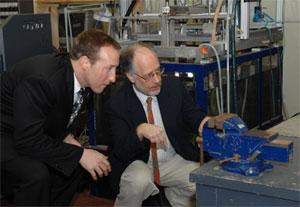 |
| Peter MacKay, Minister for the Atlantic Gateway, gets a tour of professor Alex Hay's lab. (Danny Abriel Photo) |
Violent storm waves lash beaches and undercut coastlines. Agricultural and industrial contaminants escape into rivers and are dispersed. Currents are disrupted by the placement of bridges or submarine cables, causing sediment accumulation downstream. Silt is clogging harbour channels, making shipping lanes impassable.
Improving the understanding and prediction of how sediments move through water has many potential applications, says Eric Siegel, of Nortek Scientific. The Halifax-based firm has partnered with a university research team to develop a commercially viable prototype of a highly sensitive underwater acoustic instrument.
Until now, predictions of sediment transport have relied on computer modeling techniques. Unfortunately, this traditional method tends to produce inaccurate results, says Dalhousie’s Alex Hay, principal investigator.
For many years, he and his team have worked together with Len Zedel, from Memorial University of Newfoundland. Finally, in recent years, they’ve honed a highly-sensitive device able to precisely measure small scale movements, down to milimetres.
“It literally blows everything else that’s available out of the water,” he says with a laugh.
The non-invasive sensor doesn’t interfere with natural processes and generates massive amounts of data.
“Now, we need to take this good idea and develop a purpose built instrument with a better price point that is easier to operate,” says Dr. Siegel.
This knowledge transfer is being supported by the Atlantic Canada Opportunity Agency’s (ACOA) Atlantic Innovation Fund, which will support the commercialization efforts with a $1.1 million investment. The Hon. Peter MacKay, Minister of National Defence and Minister for the Atlantic Gateway, announced the most recent round of AIF funding at Dalhousie’s University Hall on Jan. 23. Half a dozen projects were funded at $12.4 million, which will produce additional private-sector investment (a government investment of $1 is expected to leverage $1.36 in private funding).
Minister MacKay acknowledged that these are difficult times in the world’s economy but added that a commitment to science and technology innovations will provide a foundation for a strong recovery. Linking university, government and business together takes innovations out of the lab and into the marketplace—to date, AIF has created hundreds of partnerships.
The AIF is a catalyst for collaboration between the university and entrepreneurs, enabling a sharper focus on community needs and problem-solving, says President Tom Traves.
Dalhousie’s graduate students provide another means of technology transfer, bringing their new ideas and approaches to the business world.
“Like the tides, they are an ever renewing and powerful force of change,” says Dr. Traves.
The six successful projects were:
- Dalhousie University, Advanced Acoustics Technologies for Measuring
Dalhousie University, in collaboration with Memorial University and Nortek Scientific will develop a new automated acoustic instrumentation system for high resolution measurement of fluid and sediment transport in aquatic environments. - Oxford Frozen Foods: Risk Mitigation System for Wild Blueberry Production
Oxford Frozen Foods, in partnership with the Nova Scotia Agricultural College, will develop new technology based products, processes and services—including pest and disease management—with an aim to increase harvestable yields, reduce costs of production, improve product quality and enhance environmental stewardship. - Helly Hanson Canada Ltd.: Innovations in Cold Water Survival Suits
Helly Hanson, in collaboration with the Canada-Nova Scotia Offshore Petroleum Board and ExxonMobile Canada, will investigate technological innovations that have the potential to improve the cold water survival suit, making them more effective in saving lives. - C-Vision Limited: Command and Control/Solar Power Lighting in LED Roadway Lights
C-Vision will develop technological innovations for LED roadway light infrastructure. The goal is to incorporate renewable energy into outdoor lighting, to significantly reduce energy consumption. - Keata Pharma Inc.: Daffodil-derived Product for Treatment of Alzheimer’s Disease
Keata Pharma Inc. will focus on the commercialization of a daffodil-derived natural product that can be used in the treatment of Alzheimer’s Disease, in collaboration with the Nova Scotia Agricultural College and the National Research Council’s Institute of Nutri-Sciences and Health. - Genome Atlantic: Maturation Challenge in Cod Aquaculture
Genome Atlantic will develop new processes to reduce early maturation and elevated mortality in farmed cod, a significant problem facing the Atlantic industry.
